International Marketing: Finland PESTEL Analysis and Recommendations
VerifiedAdded on 2023/01/18
|10
|3252
|46
Report
AI Summary
This report presents a PESTEL analysis of Finland's business environment, focusing on factors influencing international marketing strategies. The analysis examines political stability, economic indicators (GDP, inflation, unemployment), social trends (education, language), technological advancements, and environmental considerations. The report specifically assesses the automotive and retail sectors, identifying opportunities and challenges for international firms. It highlights Finland's stable government, low corruption, strong economy, and technological leadership as positive factors, while also acknowledging challenges like high labor costs and language barriers. The report provides recommendations for international firms considering market entry into Finland, emphasizing the importance of adapting strategies to the local context and leveraging Finland's strengths. The conclusion summarizes the key findings and reiterates the potential for international firms to succeed in the Finnish market, especially in sectors aligned with technological innovation and environmental sustainability.
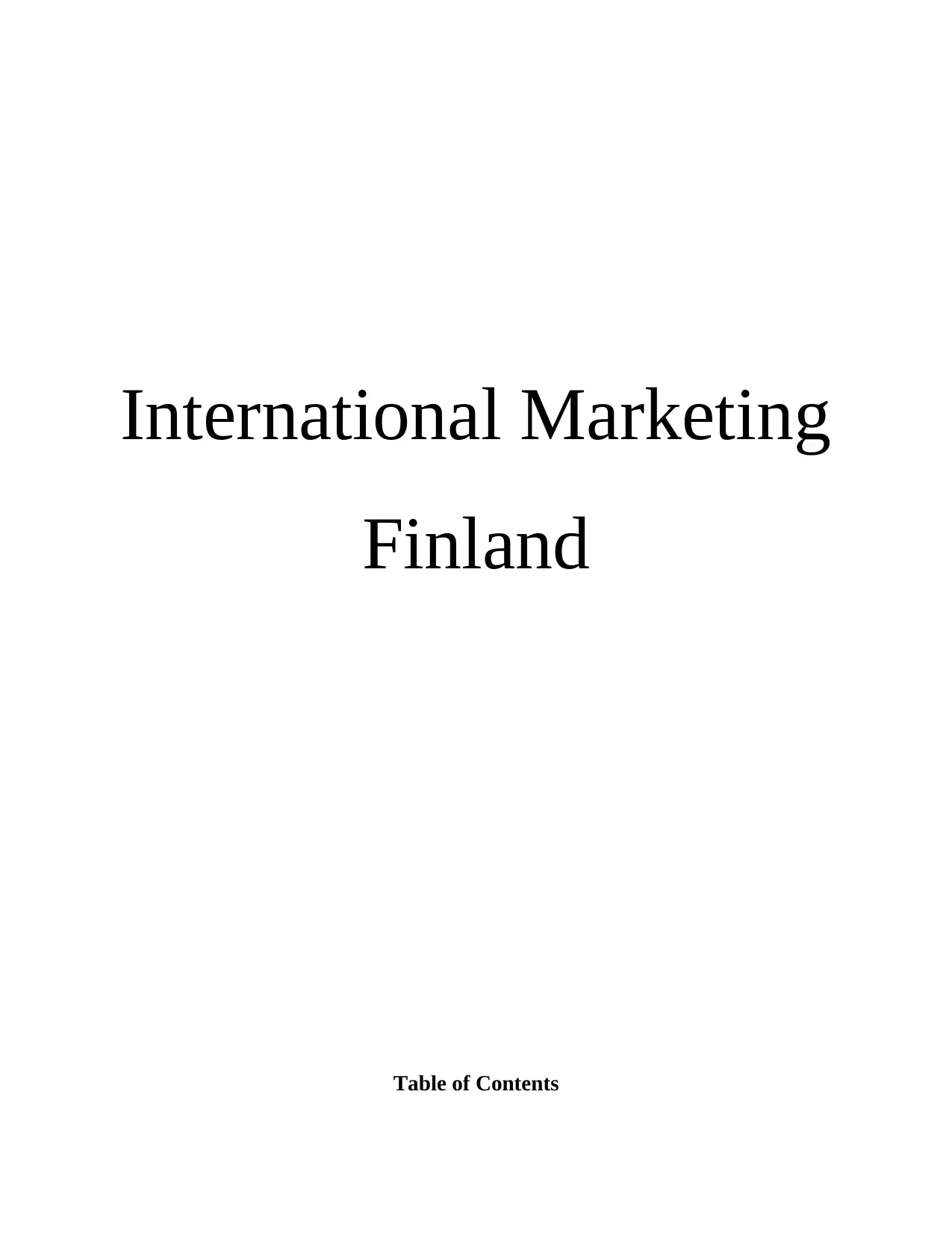
International Marketing
Finland
Table of Contents
Finland
Table of Contents
Paraphrase This Document
Need a fresh take? Get an instant paraphrase of this document with our AI Paraphraser

INTRODUCTION...........................................................................................................................1
PESTAL analysis for Finland.................................................................................................1
Recommendations..................................................................................................................6
CONCLUSION ...............................................................................................................................7
REFERENCES ...............................................................................................................................8
PESTAL analysis for Finland.................................................................................................1
Recommendations..................................................................................................................6
CONCLUSION ...............................................................................................................................7
REFERENCES ...............................................................................................................................8
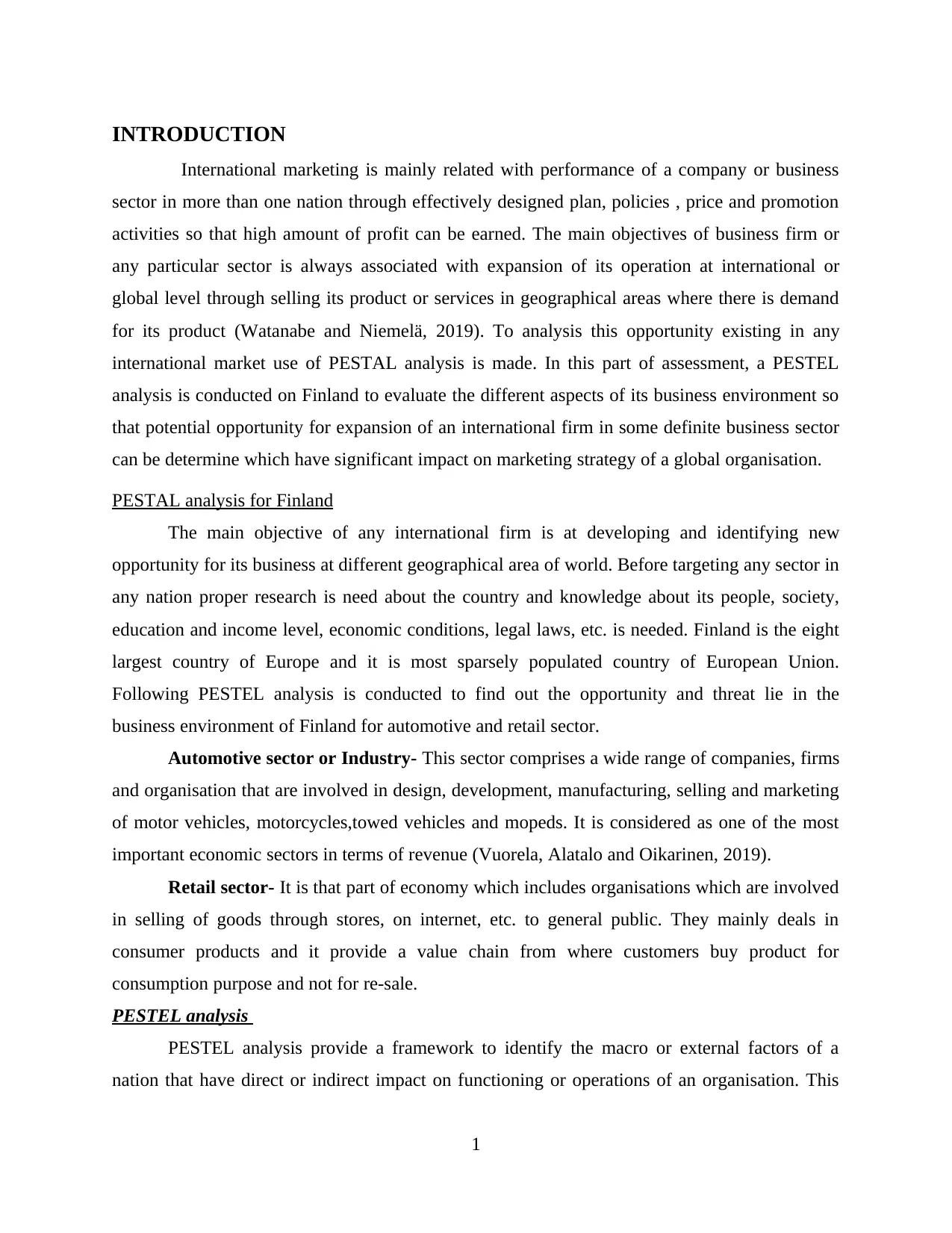
INTRODUCTION
International marketing is mainly related with performance of a company or business
sector in more than one nation through effectively designed plan, policies , price and promotion
activities so that high amount of profit can be earned. The main objectives of business firm or
any particular sector is always associated with expansion of its operation at international or
global level through selling its product or services in geographical areas where there is demand
for its product (Watanabe and Niemelä, 2019). To analysis this opportunity existing in any
international market use of PESTAL analysis is made. In this part of assessment, a PESTEL
analysis is conducted on Finland to evaluate the different aspects of its business environment so
that potential opportunity for expansion of an international firm in some definite business sector
can be determine which have significant impact on marketing strategy of a global organisation.
PESTAL analysis for Finland
The main objective of any international firm is at developing and identifying new
opportunity for its business at different geographical area of world. Before targeting any sector in
any nation proper research is need about the country and knowledge about its people, society,
education and income level, economic conditions, legal laws, etc. is needed. Finland is the eight
largest country of Europe and it is most sparsely populated country of European Union.
Following PESTEL analysis is conducted to find out the opportunity and threat lie in the
business environment of Finland for automotive and retail sector.
Automotive sector or Industry- This sector comprises a wide range of companies, firms
and organisation that are involved in design, development, manufacturing, selling and marketing
of motor vehicles, motorcycles,towed vehicles and mopeds. It is considered as one of the most
important economic sectors in terms of revenue (Vuorela, Alatalo and Oikarinen, 2019).
Retail sector- It is that part of economy which includes organisations which are involved
in selling of goods through stores, on internet, etc. to general public. They mainly deals in
consumer products and it provide a value chain from where customers buy product for
consumption purpose and not for re-sale.
PESTEL analysis
PESTEL analysis provide a framework to identify the macro or external factors of a
nation that have direct or indirect impact on functioning or operations of an organisation. This
1
International marketing is mainly related with performance of a company or business
sector in more than one nation through effectively designed plan, policies , price and promotion
activities so that high amount of profit can be earned. The main objectives of business firm or
any particular sector is always associated with expansion of its operation at international or
global level through selling its product or services in geographical areas where there is demand
for its product (Watanabe and Niemelä, 2019). To analysis this opportunity existing in any
international market use of PESTAL analysis is made. In this part of assessment, a PESTEL
analysis is conducted on Finland to evaluate the different aspects of its business environment so
that potential opportunity for expansion of an international firm in some definite business sector
can be determine which have significant impact on marketing strategy of a global organisation.
PESTAL analysis for Finland
The main objective of any international firm is at developing and identifying new
opportunity for its business at different geographical area of world. Before targeting any sector in
any nation proper research is need about the country and knowledge about its people, society,
education and income level, economic conditions, legal laws, etc. is needed. Finland is the eight
largest country of Europe and it is most sparsely populated country of European Union.
Following PESTEL analysis is conducted to find out the opportunity and threat lie in the
business environment of Finland for automotive and retail sector.
Automotive sector or Industry- This sector comprises a wide range of companies, firms
and organisation that are involved in design, development, manufacturing, selling and marketing
of motor vehicles, motorcycles,towed vehicles and mopeds. It is considered as one of the most
important economic sectors in terms of revenue (Vuorela, Alatalo and Oikarinen, 2019).
Retail sector- It is that part of economy which includes organisations which are involved
in selling of goods through stores, on internet, etc. to general public. They mainly deals in
consumer products and it provide a value chain from where customers buy product for
consumption purpose and not for re-sale.
PESTEL analysis
PESTEL analysis provide a framework to identify the macro or external factors of a
nation that have direct or indirect impact on functioning or operations of an organisation. This
1
⊘ This is a preview!⊘
Do you want full access?
Subscribe today to unlock all pages.

Trusted by 1+ million students worldwide
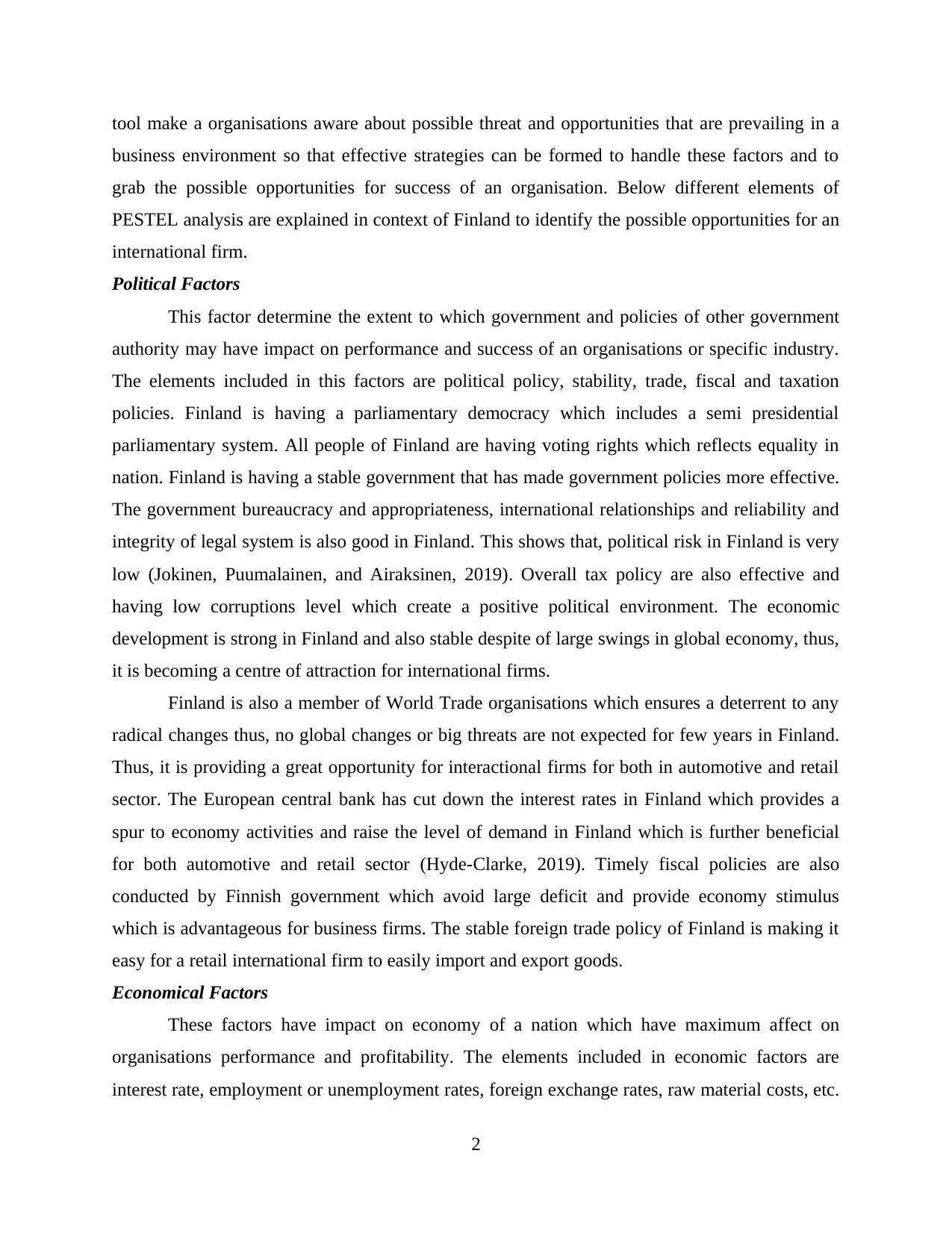
tool make a organisations aware about possible threat and opportunities that are prevailing in a
business environment so that effective strategies can be formed to handle these factors and to
grab the possible opportunities for success of an organisation. Below different elements of
PESTEL analysis are explained in context of Finland to identify the possible opportunities for an
international firm.
Political Factors
This factor determine the extent to which government and policies of other government
authority may have impact on performance and success of an organisations or specific industry.
The elements included in this factors are political policy, stability, trade, fiscal and taxation
policies. Finland is having a parliamentary democracy which includes a semi presidential
parliamentary system. All people of Finland are having voting rights which reflects equality in
nation. Finland is having a stable government that has made government policies more effective.
The government bureaucracy and appropriateness, international relationships and reliability and
integrity of legal system is also good in Finland. This shows that, political risk in Finland is very
low (Jokinen, Puumalainen, and Airaksinen, 2019). Overall tax policy are also effective and
having low corruptions level which create a positive political environment. The economic
development is strong in Finland and also stable despite of large swings in global economy, thus,
it is becoming a centre of attraction for international firms.
Finland is also a member of World Trade organisations which ensures a deterrent to any
radical changes thus, no global changes or big threats are not expected for few years in Finland.
Thus, it is providing a great opportunity for interactional firms for both in automotive and retail
sector. The European central bank has cut down the interest rates in Finland which provides a
spur to economy activities and raise the level of demand in Finland which is further beneficial
for both automotive and retail sector (Hyde-Clarke, 2019). Timely fiscal policies are also
conducted by Finnish government which avoid large deficit and provide economy stimulus
which is advantageous for business firms. The stable foreign trade policy of Finland is making it
easy for a retail international firm to easily import and export goods.
Economical Factors
These factors have impact on economy of a nation which have maximum affect on
organisations performance and profitability. The elements included in economic factors are
interest rate, employment or unemployment rates, foreign exchange rates, raw material costs, etc.
2
business environment so that effective strategies can be formed to handle these factors and to
grab the possible opportunities for success of an organisation. Below different elements of
PESTEL analysis are explained in context of Finland to identify the possible opportunities for an
international firm.
Political Factors
This factor determine the extent to which government and policies of other government
authority may have impact on performance and success of an organisations or specific industry.
The elements included in this factors are political policy, stability, trade, fiscal and taxation
policies. Finland is having a parliamentary democracy which includes a semi presidential
parliamentary system. All people of Finland are having voting rights which reflects equality in
nation. Finland is having a stable government that has made government policies more effective.
The government bureaucracy and appropriateness, international relationships and reliability and
integrity of legal system is also good in Finland. This shows that, political risk in Finland is very
low (Jokinen, Puumalainen, and Airaksinen, 2019). Overall tax policy are also effective and
having low corruptions level which create a positive political environment. The economic
development is strong in Finland and also stable despite of large swings in global economy, thus,
it is becoming a centre of attraction for international firms.
Finland is also a member of World Trade organisations which ensures a deterrent to any
radical changes thus, no global changes or big threats are not expected for few years in Finland.
Thus, it is providing a great opportunity for interactional firms for both in automotive and retail
sector. The European central bank has cut down the interest rates in Finland which provides a
spur to economy activities and raise the level of demand in Finland which is further beneficial
for both automotive and retail sector (Hyde-Clarke, 2019). Timely fiscal policies are also
conducted by Finnish government which avoid large deficit and provide economy stimulus
which is advantageous for business firms. The stable foreign trade policy of Finland is making it
easy for a retail international firm to easily import and export goods.
Economical Factors
These factors have impact on economy of a nation which have maximum affect on
organisations performance and profitability. The elements included in economic factors are
interest rate, employment or unemployment rates, foreign exchange rates, raw material costs, etc.
2
Paraphrase This Document
Need a fresh take? Get an instant paraphrase of this document with our AI Paraphraser
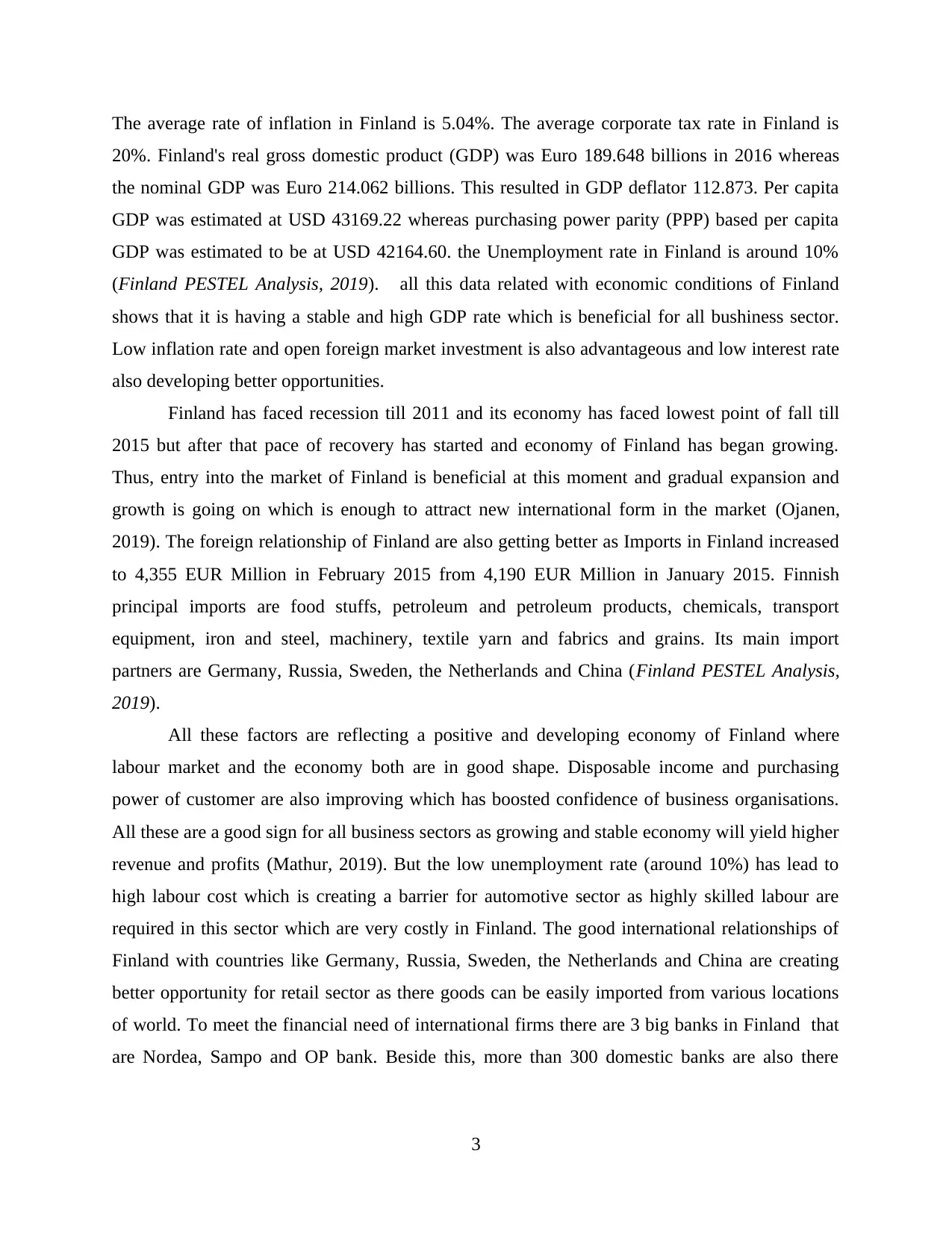
The average rate of inflation in Finland is 5.04%. The average corporate tax rate in Finland is
20%. Finland's real gross domestic product (GDP) was Euro 189.648 billions in 2016 whereas
the nominal GDP was Euro 214.062 billions. This resulted in GDP deflator 112.873. Per capita
GDP was estimated at USD 43169.22 whereas purchasing power parity (PPP) based per capita
GDP was estimated to be at USD 42164.60. the Unemployment rate in Finland is around 10%
(Finland PESTEL Analysis, 2019). all this data related with economic conditions of Finland
shows that it is having a stable and high GDP rate which is beneficial for all bushiness sector.
Low inflation rate and open foreign market investment is also advantageous and low interest rate
also developing better opportunities.
Finland has faced recession till 2011 and its economy has faced lowest point of fall till
2015 but after that pace of recovery has started and economy of Finland has began growing.
Thus, entry into the market of Finland is beneficial at this moment and gradual expansion and
growth is going on which is enough to attract new international form in the market (Ojanen,
2019). The foreign relationship of Finland are also getting better as Imports in Finland increased
to 4,355 EUR Million in February 2015 from 4,190 EUR Million in January 2015. Finnish
principal imports are food stuffs, petroleum and petroleum products, chemicals, transport
equipment, iron and steel, machinery, textile yarn and fabrics and grains. Its main import
partners are Germany, Russia, Sweden, the Netherlands and China (Finland PESTEL Analysis,
2019).
All these factors are reflecting a positive and developing economy of Finland where
labour market and the economy both are in good shape. Disposable income and purchasing
power of customer are also improving which has boosted confidence of business organisations.
All these are a good sign for all business sectors as growing and stable economy will yield higher
revenue and profits (Mathur, 2019). But the low unemployment rate (around 10%) has lead to
high labour cost which is creating a barrier for automotive sector as highly skilled labour are
required in this sector which are very costly in Finland. The good international relationships of
Finland with countries like Germany, Russia, Sweden, the Netherlands and China are creating
better opportunity for retail sector as there goods can be easily imported from various locations
of world. To meet the financial need of international firms there are 3 big banks in Finland that
are Nordea, Sampo and OP bank. Beside this, more than 300 domestic banks are also there
3
20%. Finland's real gross domestic product (GDP) was Euro 189.648 billions in 2016 whereas
the nominal GDP was Euro 214.062 billions. This resulted in GDP deflator 112.873. Per capita
GDP was estimated at USD 43169.22 whereas purchasing power parity (PPP) based per capita
GDP was estimated to be at USD 42164.60. the Unemployment rate in Finland is around 10%
(Finland PESTEL Analysis, 2019). all this data related with economic conditions of Finland
shows that it is having a stable and high GDP rate which is beneficial for all bushiness sector.
Low inflation rate and open foreign market investment is also advantageous and low interest rate
also developing better opportunities.
Finland has faced recession till 2011 and its economy has faced lowest point of fall till
2015 but after that pace of recovery has started and economy of Finland has began growing.
Thus, entry into the market of Finland is beneficial at this moment and gradual expansion and
growth is going on which is enough to attract new international form in the market (Ojanen,
2019). The foreign relationship of Finland are also getting better as Imports in Finland increased
to 4,355 EUR Million in February 2015 from 4,190 EUR Million in January 2015. Finnish
principal imports are food stuffs, petroleum and petroleum products, chemicals, transport
equipment, iron and steel, machinery, textile yarn and fabrics and grains. Its main import
partners are Germany, Russia, Sweden, the Netherlands and China (Finland PESTEL Analysis,
2019).
All these factors are reflecting a positive and developing economy of Finland where
labour market and the economy both are in good shape. Disposable income and purchasing
power of customer are also improving which has boosted confidence of business organisations.
All these are a good sign for all business sectors as growing and stable economy will yield higher
revenue and profits (Mathur, 2019). But the low unemployment rate (around 10%) has lead to
high labour cost which is creating a barrier for automotive sector as highly skilled labour are
required in this sector which are very costly in Finland. The good international relationships of
Finland with countries like Germany, Russia, Sweden, the Netherlands and China are creating
better opportunity for retail sector as there goods can be easily imported from various locations
of world. To meet the financial need of international firms there are 3 big banks in Finland that
are Nordea, Sampo and OP bank. Beside this, more than 300 domestic banks are also there
3
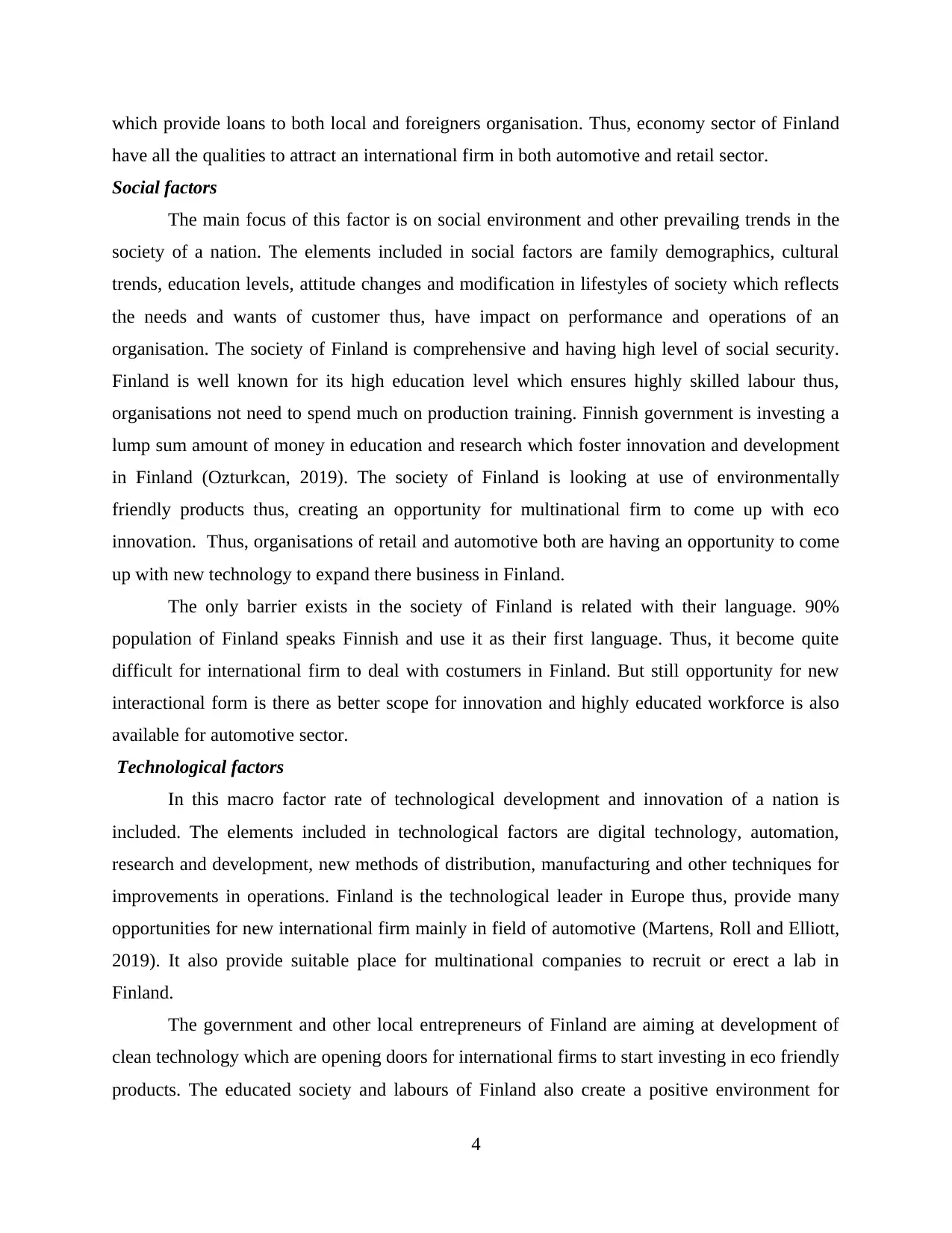
which provide loans to both local and foreigners organisation. Thus, economy sector of Finland
have all the qualities to attract an international firm in both automotive and retail sector.
Social factors
The main focus of this factor is on social environment and other prevailing trends in the
society of a nation. The elements included in social factors are family demographics, cultural
trends, education levels, attitude changes and modification in lifestyles of society which reflects
the needs and wants of customer thus, have impact on performance and operations of an
organisation. The society of Finland is comprehensive and having high level of social security.
Finland is well known for its high education level which ensures highly skilled labour thus,
organisations not need to spend much on production training. Finnish government is investing a
lump sum amount of money in education and research which foster innovation and development
in Finland (Ozturkcan, 2019). The society of Finland is looking at use of environmentally
friendly products thus, creating an opportunity for multinational firm to come up with eco
innovation. Thus, organisations of retail and automotive both are having an opportunity to come
up with new technology to expand there business in Finland.
The only barrier exists in the society of Finland is related with their language. 90%
population of Finland speaks Finnish and use it as their first language. Thus, it become quite
difficult for international firm to deal with costumers in Finland. But still opportunity for new
interactional form is there as better scope for innovation and highly educated workforce is also
available for automotive sector.
Technological factors
In this macro factor rate of technological development and innovation of a nation is
included. The elements included in technological factors are digital technology, automation,
research and development, new methods of distribution, manufacturing and other techniques for
improvements in operations. Finland is the technological leader in Europe thus, provide many
opportunities for new international firm mainly in field of automotive (Martens, Roll and Elliott,
2019). It also provide suitable place for multinational companies to recruit or erect a lab in
Finland.
The government and other local entrepreneurs of Finland are aiming at development of
clean technology which are opening doors for international firms to start investing in eco friendly
products. The educated society and labours of Finland also create a positive environment for
4
have all the qualities to attract an international firm in both automotive and retail sector.
Social factors
The main focus of this factor is on social environment and other prevailing trends in the
society of a nation. The elements included in social factors are family demographics, cultural
trends, education levels, attitude changes and modification in lifestyles of society which reflects
the needs and wants of customer thus, have impact on performance and operations of an
organisation. The society of Finland is comprehensive and having high level of social security.
Finland is well known for its high education level which ensures highly skilled labour thus,
organisations not need to spend much on production training. Finnish government is investing a
lump sum amount of money in education and research which foster innovation and development
in Finland (Ozturkcan, 2019). The society of Finland is looking at use of environmentally
friendly products thus, creating an opportunity for multinational firm to come up with eco
innovation. Thus, organisations of retail and automotive both are having an opportunity to come
up with new technology to expand there business in Finland.
The only barrier exists in the society of Finland is related with their language. 90%
population of Finland speaks Finnish and use it as their first language. Thus, it become quite
difficult for international firm to deal with costumers in Finland. But still opportunity for new
interactional form is there as better scope for innovation and highly educated workforce is also
available for automotive sector.
Technological factors
In this macro factor rate of technological development and innovation of a nation is
included. The elements included in technological factors are digital technology, automation,
research and development, new methods of distribution, manufacturing and other techniques for
improvements in operations. Finland is the technological leader in Europe thus, provide many
opportunities for new international firm mainly in field of automotive (Martens, Roll and Elliott,
2019). It also provide suitable place for multinational companies to recruit or erect a lab in
Finland.
The government and other local entrepreneurs of Finland are aiming at development of
clean technology which are opening doors for international firms to start investing in eco friendly
products. The educated society and labours of Finland also create a positive environment for
4
⊘ This is a preview!⊘
Do you want full access?
Subscribe today to unlock all pages.

Trusted by 1+ million students worldwide
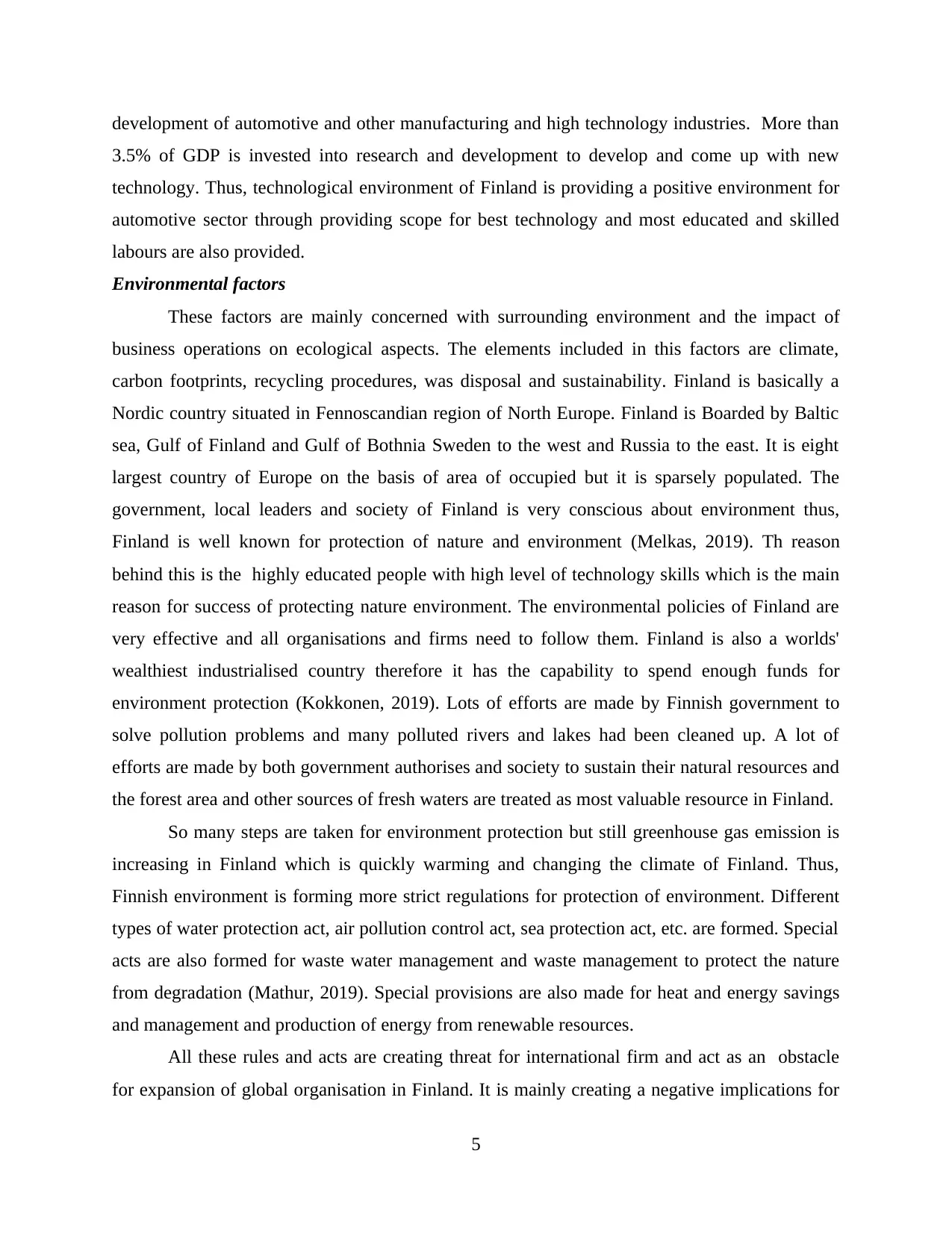
development of automotive and other manufacturing and high technology industries. More than
3.5% of GDP is invested into research and development to develop and come up with new
technology. Thus, technological environment of Finland is providing a positive environment for
automotive sector through providing scope for best technology and most educated and skilled
labours are also provided.
Environmental factors
These factors are mainly concerned with surrounding environment and the impact of
business operations on ecological aspects. The elements included in this factors are climate,
carbon footprints, recycling procedures, was disposal and sustainability. Finland is basically a
Nordic country situated in Fennoscandian region of North Europe. Finland is Boarded by Baltic
sea, Gulf of Finland and Gulf of Bothnia Sweden to the west and Russia to the east. It is eight
largest country of Europe on the basis of area of occupied but it is sparsely populated. The
government, local leaders and society of Finland is very conscious about environment thus,
Finland is well known for protection of nature and environment (Melkas, 2019). Th reason
behind this is the highly educated people with high level of technology skills which is the main
reason for success of protecting nature environment. The environmental policies of Finland are
very effective and all organisations and firms need to follow them. Finland is also a worlds'
wealthiest industrialised country therefore it has the capability to spend enough funds for
environment protection (Kokkonen, 2019). Lots of efforts are made by Finnish government to
solve pollution problems and many polluted rivers and lakes had been cleaned up. A lot of
efforts are made by both government authorises and society to sustain their natural resources and
the forest area and other sources of fresh waters are treated as most valuable resource in Finland.
So many steps are taken for environment protection but still greenhouse gas emission is
increasing in Finland which is quickly warming and changing the climate of Finland. Thus,
Finnish environment is forming more strict regulations for protection of environment. Different
types of water protection act, air pollution control act, sea protection act, etc. are formed. Special
acts are also formed for waste water management and waste management to protect the nature
from degradation (Mathur, 2019). Special provisions are also made for heat and energy savings
and management and production of energy from renewable resources.
All these rules and acts are creating threat for international firm and act as an obstacle
for expansion of global organisation in Finland. It is mainly creating a negative implications for
5
3.5% of GDP is invested into research and development to develop and come up with new
technology. Thus, technological environment of Finland is providing a positive environment for
automotive sector through providing scope for best technology and most educated and skilled
labours are also provided.
Environmental factors
These factors are mainly concerned with surrounding environment and the impact of
business operations on ecological aspects. The elements included in this factors are climate,
carbon footprints, recycling procedures, was disposal and sustainability. Finland is basically a
Nordic country situated in Fennoscandian region of North Europe. Finland is Boarded by Baltic
sea, Gulf of Finland and Gulf of Bothnia Sweden to the west and Russia to the east. It is eight
largest country of Europe on the basis of area of occupied but it is sparsely populated. The
government, local leaders and society of Finland is very conscious about environment thus,
Finland is well known for protection of nature and environment (Melkas, 2019). Th reason
behind this is the highly educated people with high level of technology skills which is the main
reason for success of protecting nature environment. The environmental policies of Finland are
very effective and all organisations and firms need to follow them. Finland is also a worlds'
wealthiest industrialised country therefore it has the capability to spend enough funds for
environment protection (Kokkonen, 2019). Lots of efforts are made by Finnish government to
solve pollution problems and many polluted rivers and lakes had been cleaned up. A lot of
efforts are made by both government authorises and society to sustain their natural resources and
the forest area and other sources of fresh waters are treated as most valuable resource in Finland.
So many steps are taken for environment protection but still greenhouse gas emission is
increasing in Finland which is quickly warming and changing the climate of Finland. Thus,
Finnish environment is forming more strict regulations for protection of environment. Different
types of water protection act, air pollution control act, sea protection act, etc. are formed. Special
acts are also formed for waste water management and waste management to protect the nature
from degradation (Mathur, 2019). Special provisions are also made for heat and energy savings
and management and production of energy from renewable resources.
All these rules and acts are creating threat for international firm and act as an obstacle
for expansion of global organisation in Finland. It is mainly creating a negative implications for
5
Paraphrase This Document
Need a fresh take? Get an instant paraphrase of this document with our AI Paraphraser
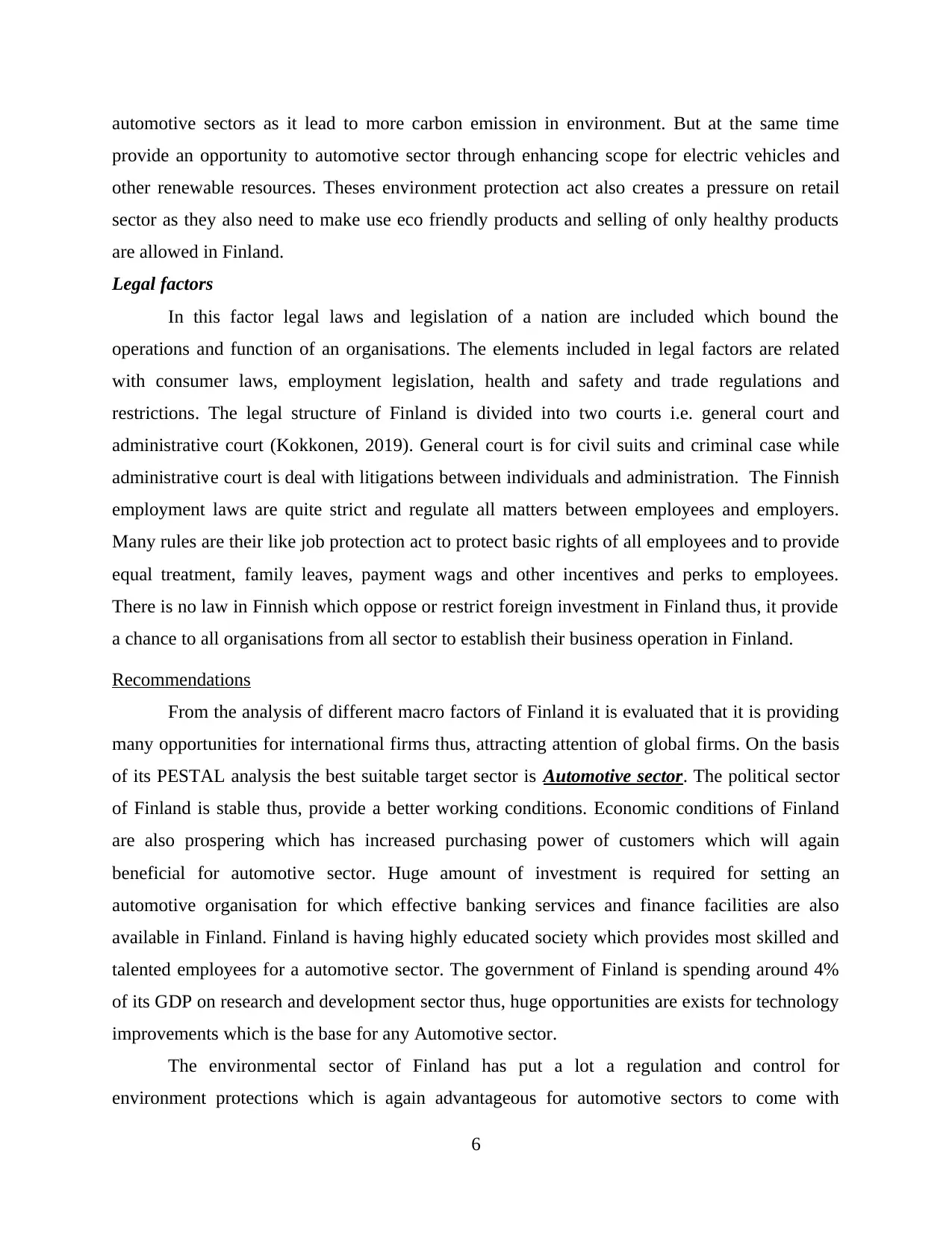
automotive sectors as it lead to more carbon emission in environment. But at the same time
provide an opportunity to automotive sector through enhancing scope for electric vehicles and
other renewable resources. Theses environment protection act also creates a pressure on retail
sector as they also need to make use eco friendly products and selling of only healthy products
are allowed in Finland.
Legal factors
In this factor legal laws and legislation of a nation are included which bound the
operations and function of an organisations. The elements included in legal factors are related
with consumer laws, employment legislation, health and safety and trade regulations and
restrictions. The legal structure of Finland is divided into two courts i.e. general court and
administrative court (Kokkonen, 2019). General court is for civil suits and criminal case while
administrative court is deal with litigations between individuals and administration. The Finnish
employment laws are quite strict and regulate all matters between employees and employers.
Many rules are their like job protection act to protect basic rights of all employees and to provide
equal treatment, family leaves, payment wags and other incentives and perks to employees.
There is no law in Finnish which oppose or restrict foreign investment in Finland thus, it provide
a chance to all organisations from all sector to establish their business operation in Finland.
Recommendations
From the analysis of different macro factors of Finland it is evaluated that it is providing
many opportunities for international firms thus, attracting attention of global firms. On the basis
of its PESTAL analysis the best suitable target sector is Automotive sector. The political sector
of Finland is stable thus, provide a better working conditions. Economic conditions of Finland
are also prospering which has increased purchasing power of customers which will again
beneficial for automotive sector. Huge amount of investment is required for setting an
automotive organisation for which effective banking services and finance facilities are also
available in Finland. Finland is having highly educated society which provides most skilled and
talented employees for a automotive sector. The government of Finland is spending around 4%
of its GDP on research and development sector thus, huge opportunities are exists for technology
improvements which is the base for any Automotive sector.
The environmental sector of Finland has put a lot a regulation and control for
environment protections which is again advantageous for automotive sectors to come with
6
provide an opportunity to automotive sector through enhancing scope for electric vehicles and
other renewable resources. Theses environment protection act also creates a pressure on retail
sector as they also need to make use eco friendly products and selling of only healthy products
are allowed in Finland.
Legal factors
In this factor legal laws and legislation of a nation are included which bound the
operations and function of an organisations. The elements included in legal factors are related
with consumer laws, employment legislation, health and safety and trade regulations and
restrictions. The legal structure of Finland is divided into two courts i.e. general court and
administrative court (Kokkonen, 2019). General court is for civil suits and criminal case while
administrative court is deal with litigations between individuals and administration. The Finnish
employment laws are quite strict and regulate all matters between employees and employers.
Many rules are their like job protection act to protect basic rights of all employees and to provide
equal treatment, family leaves, payment wags and other incentives and perks to employees.
There is no law in Finnish which oppose or restrict foreign investment in Finland thus, it provide
a chance to all organisations from all sector to establish their business operation in Finland.
Recommendations
From the analysis of different macro factors of Finland it is evaluated that it is providing
many opportunities for international firms thus, attracting attention of global firms. On the basis
of its PESTAL analysis the best suitable target sector is Automotive sector. The political sector
of Finland is stable thus, provide a better working conditions. Economic conditions of Finland
are also prospering which has increased purchasing power of customers which will again
beneficial for automotive sector. Huge amount of investment is required for setting an
automotive organisation for which effective banking services and finance facilities are also
available in Finland. Finland is having highly educated society which provides most skilled and
talented employees for a automotive sector. The government of Finland is spending around 4%
of its GDP on research and development sector thus, huge opportunities are exists for technology
improvements which is the base for any Automotive sector.
The environmental sector of Finland has put a lot a regulation and control for
environment protections which is again advantageous for automotive sectors to come with
6
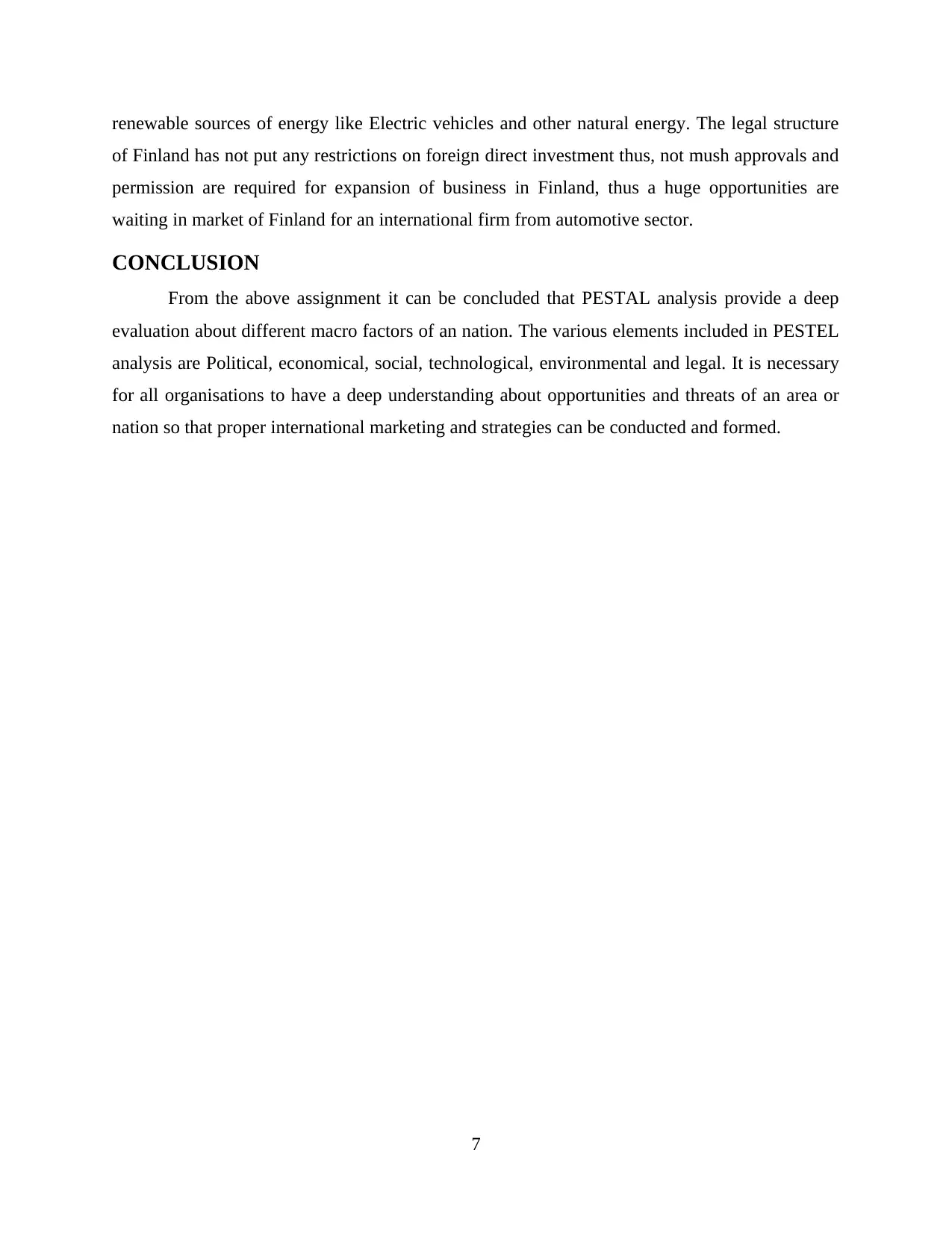
renewable sources of energy like Electric vehicles and other natural energy. The legal structure
of Finland has not put any restrictions on foreign direct investment thus, not mush approvals and
permission are required for expansion of business in Finland, thus a huge opportunities are
waiting in market of Finland for an international firm from automotive sector.
CONCLUSION
From the above assignment it can be concluded that PESTAL analysis provide a deep
evaluation about different macro factors of an nation. The various elements included in PESTEL
analysis are Political, economical, social, technological, environmental and legal. It is necessary
for all organisations to have a deep understanding about opportunities and threats of an area or
nation so that proper international marketing and strategies can be conducted and formed.
7
of Finland has not put any restrictions on foreign direct investment thus, not mush approvals and
permission are required for expansion of business in Finland, thus a huge opportunities are
waiting in market of Finland for an international firm from automotive sector.
CONCLUSION
From the above assignment it can be concluded that PESTAL analysis provide a deep
evaluation about different macro factors of an nation. The various elements included in PESTEL
analysis are Political, economical, social, technological, environmental and legal. It is necessary
for all organisations to have a deep understanding about opportunities and threats of an area or
nation so that proper international marketing and strategies can be conducted and formed.
7
⊘ This is a preview!⊘
Do you want full access?
Subscribe today to unlock all pages.

Trusted by 1+ million students worldwide
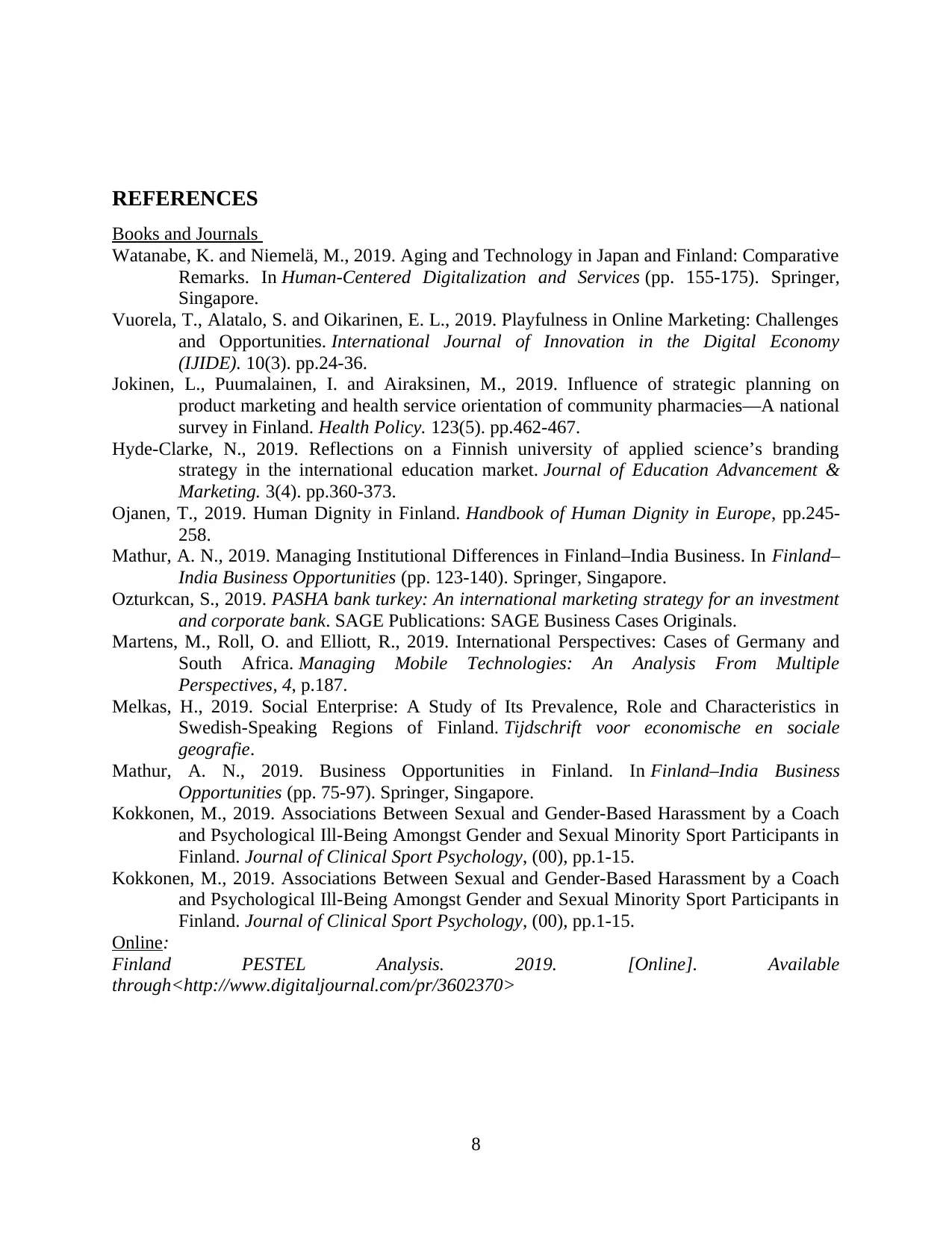
REFERENCES
Books and Journals
Watanabe, K. and Niemelä, M., 2019. Aging and Technology in Japan and Finland: Comparative
Remarks. In Human-Centered Digitalization and Services (pp. 155-175). Springer,
Singapore.
Vuorela, T., Alatalo, S. and Oikarinen, E. L., 2019. Playfulness in Online Marketing: Challenges
and Opportunities. International Journal of Innovation in the Digital Economy
(IJIDE). 10(3). pp.24-36.
Jokinen, L., Puumalainen, I. and Airaksinen, M., 2019. Influence of strategic planning on
product marketing and health service orientation of community pharmacies—A national
survey in Finland. Health Policy. 123(5). pp.462-467.
Hyde-Clarke, N., 2019. Reflections on a Finnish university of applied science’s branding
strategy in the international education market. Journal of Education Advancement &
Marketing. 3(4). pp.360-373.
Ojanen, T., 2019. Human Dignity in Finland. Handbook of Human Dignity in Europe, pp.245-
258.
Mathur, A. N., 2019. Managing Institutional Differences in Finland–India Business. In Finland–
India Business Opportunities (pp. 123-140). Springer, Singapore.
Ozturkcan, S., 2019. PASHA bank turkey: An international marketing strategy for an investment
and corporate bank. SAGE Publications: SAGE Business Cases Originals.
Martens, M., Roll, O. and Elliott, R., 2019. International Perspectives: Cases of Germany and
South Africa. Managing Mobile Technologies: An Analysis From Multiple
Perspectives, 4, p.187.
Melkas, H., 2019. Social Enterprise: A Study of Its Prevalence, Role and Characteristics in
Swedish‐Speaking Regions of Finland. Tijdschrift voor economische en sociale
geografie.
Mathur, A. N., 2019. Business Opportunities in Finland. In Finland–India Business
Opportunities (pp. 75-97). Springer, Singapore.
Kokkonen, M., 2019. Associations Between Sexual and Gender-Based Harassment by a Coach
and Psychological Ill-Being Amongst Gender and Sexual Minority Sport Participants in
Finland. Journal of Clinical Sport Psychology, (00), pp.1-15.
Kokkonen, M., 2019. Associations Between Sexual and Gender-Based Harassment by a Coach
and Psychological Ill-Being Amongst Gender and Sexual Minority Sport Participants in
Finland. Journal of Clinical Sport Psychology, (00), pp.1-15.
Online:
Finland PESTEL Analysis. 2019. [Online]. Available
through<http://www.digitaljournal.com/pr/3602370>
8
Books and Journals
Watanabe, K. and Niemelä, M., 2019. Aging and Technology in Japan and Finland: Comparative
Remarks. In Human-Centered Digitalization and Services (pp. 155-175). Springer,
Singapore.
Vuorela, T., Alatalo, S. and Oikarinen, E. L., 2019. Playfulness in Online Marketing: Challenges
and Opportunities. International Journal of Innovation in the Digital Economy
(IJIDE). 10(3). pp.24-36.
Jokinen, L., Puumalainen, I. and Airaksinen, M., 2019. Influence of strategic planning on
product marketing and health service orientation of community pharmacies—A national
survey in Finland. Health Policy. 123(5). pp.462-467.
Hyde-Clarke, N., 2019. Reflections on a Finnish university of applied science’s branding
strategy in the international education market. Journal of Education Advancement &
Marketing. 3(4). pp.360-373.
Ojanen, T., 2019. Human Dignity in Finland. Handbook of Human Dignity in Europe, pp.245-
258.
Mathur, A. N., 2019. Managing Institutional Differences in Finland–India Business. In Finland–
India Business Opportunities (pp. 123-140). Springer, Singapore.
Ozturkcan, S., 2019. PASHA bank turkey: An international marketing strategy for an investment
and corporate bank. SAGE Publications: SAGE Business Cases Originals.
Martens, M., Roll, O. and Elliott, R., 2019. International Perspectives: Cases of Germany and
South Africa. Managing Mobile Technologies: An Analysis From Multiple
Perspectives, 4, p.187.
Melkas, H., 2019. Social Enterprise: A Study of Its Prevalence, Role and Characteristics in
Swedish‐Speaking Regions of Finland. Tijdschrift voor economische en sociale
geografie.
Mathur, A. N., 2019. Business Opportunities in Finland. In Finland–India Business
Opportunities (pp. 75-97). Springer, Singapore.
Kokkonen, M., 2019. Associations Between Sexual and Gender-Based Harassment by a Coach
and Psychological Ill-Being Amongst Gender and Sexual Minority Sport Participants in
Finland. Journal of Clinical Sport Psychology, (00), pp.1-15.
Kokkonen, M., 2019. Associations Between Sexual and Gender-Based Harassment by a Coach
and Psychological Ill-Being Amongst Gender and Sexual Minority Sport Participants in
Finland. Journal of Clinical Sport Psychology, (00), pp.1-15.
Online:
Finland PESTEL Analysis. 2019. [Online]. Available
through<http://www.digitaljournal.com/pr/3602370>
8
1 out of 10
Related Documents
Your All-in-One AI-Powered Toolkit for Academic Success.
+13062052269
info@desklib.com
Available 24*7 on WhatsApp / Email
![[object Object]](/_next/static/media/star-bottom.7253800d.svg)
Unlock your academic potential
Copyright © 2020–2026 A2Z Services. All Rights Reserved. Developed and managed by ZUCOL.





